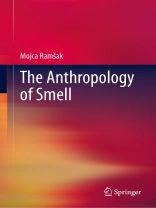This book discusses the meaning of smell from a socio-cultural perspective and brings important considerations of smell and olfaction beyond anatomy and physiology in an erudite, reader-friendly style. It addresses ideas about smell and odor in culturally diverse contexts; pays attention to the subtle ways in which smell is expressed; treats smell as part of memory, prejudice, rumor, and sexuality; offers insights into the role of smell in religion, literature, film art, intangible cultural heritage, and museum practices, with particular attention to the challenges posed by historical smells; describes the legal regulation of smell and the background to scent marketing that seeks to influence consumer buying habits, adding a unique and practical dimension to the content. In addition to philosophical and medical historical aspects, the book offers insights into the evolution, diagnosis and impact of the COVID-19 pandemic on the human sense of smell and illustrates how our environment and societal influences shape our sensory perceptions and thus our attitudes and interpretation of the olfactory world around us. From an anthropological perspective, the book looks at olfactory heritage, cultural traditions, and the symbolism of the nose in different societies. Overall, it offers a comprehensive and thought-provoking cultural examination of the sense of smell — a sense that is often underestimated — while broadening our understanding of the world of smell and its role in our lives.
“Ramšak’s research provides valuable insights into the relationship between smell and culture, including its influence on identity, memory, social interactions, cultural practices, and beliefs. The book is a valuable resource for sensory anthropology, olfactory and intangible heritage.”
Prof. Dr. Katja Hrobat Virloget, University of Primorska, The Faculty of Humanities, Department of Anthropology and Cultural Studies, Koper, Slovenia
“The remarkable depth and breadth of the subtle connection between smell and culture is testament to Ramšak’s deep engagement with the subject and her exceptional understanding of the global patterns of cultural connotations associated with smell.”
Prof. Dr. Sophie Elpers, The Royal Netherlands Academy of Arts and Sciences, Meertens Institut, Amsterdam, The Netherlands
Tabla de materias
Introduction: Deeper Breath: An Outline of the Topic.- How to Conduct Smell Research and Where to Find the Sources?.- Olfactory Language.- Smell in Medicine.- Olfactory Imaginary: The Smell and Religion.- Olfactory Imaginary: The Smell of the Other Racist and Xenophobic Olfactory Stereotypes.- Legal Aspects of Odor Regulation and Scent Marketing.- Scent Marketing.- Smell in Sexuality and Eroticism.- Intangible Olfactory Heritage in Museum Practice.
Sobre el autor
Mojca Ramšak holds a Ph D in ethnology from the University of Ljubljana, Slovenia, where she is a full professor of cultural and social anthropology. She is also a full professor of anthropology at the Alma Mater Europaea – Faculty of Humanities, Institutum Studiorum Humanitatis, Ljubljana (AMEU – ISH). She has authored ten independent academic monographs in various fields such as minority studies, ethnology, cultural anthropology, oral history, medical humanities, history of medicine, philosophy and cultural heritage. Her research is mostly interdisciplinary and focuses on the use of innovative research methods, experimental and traditional forms of qualitative research in the interest of social justice, human dignity and human rights












